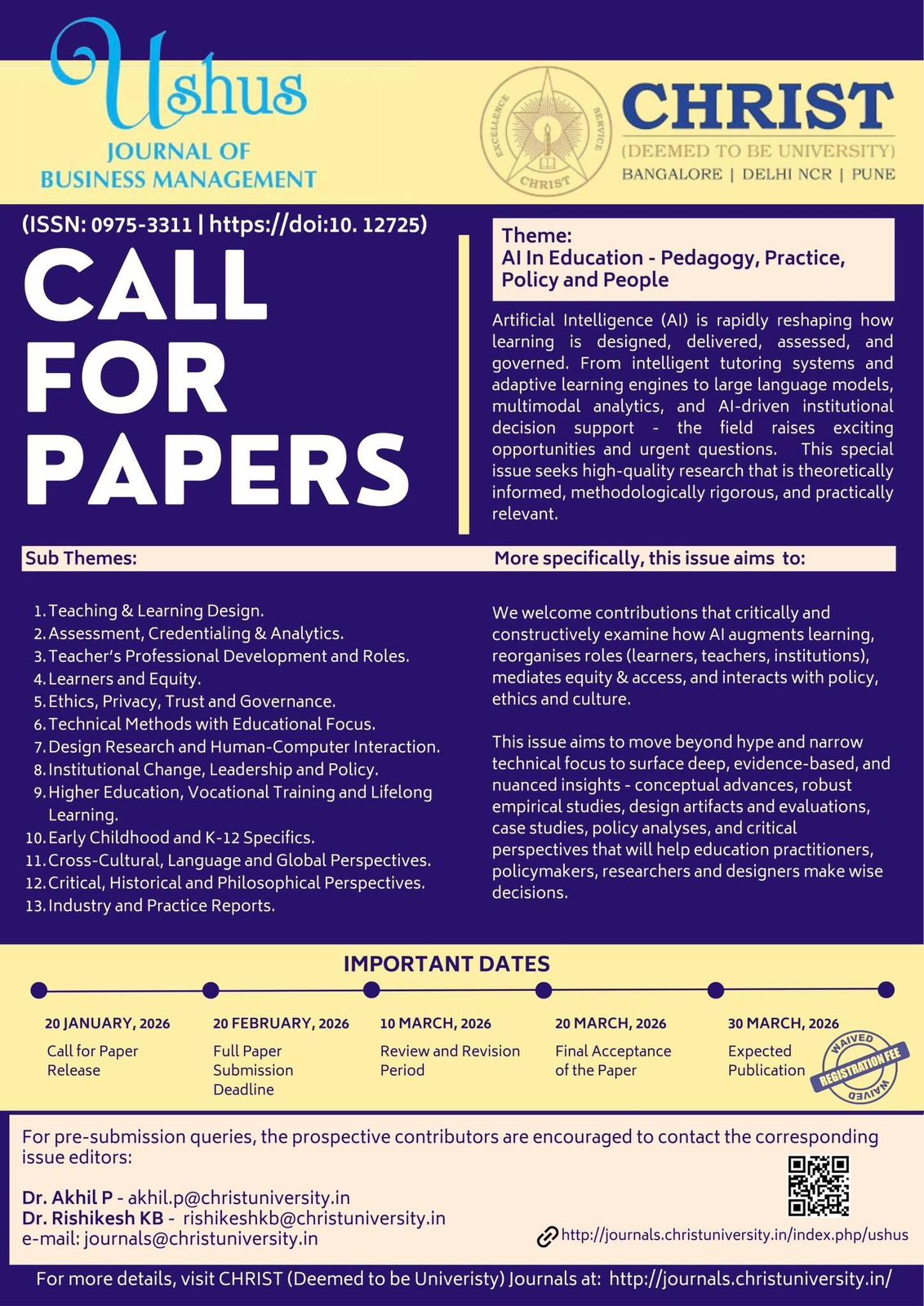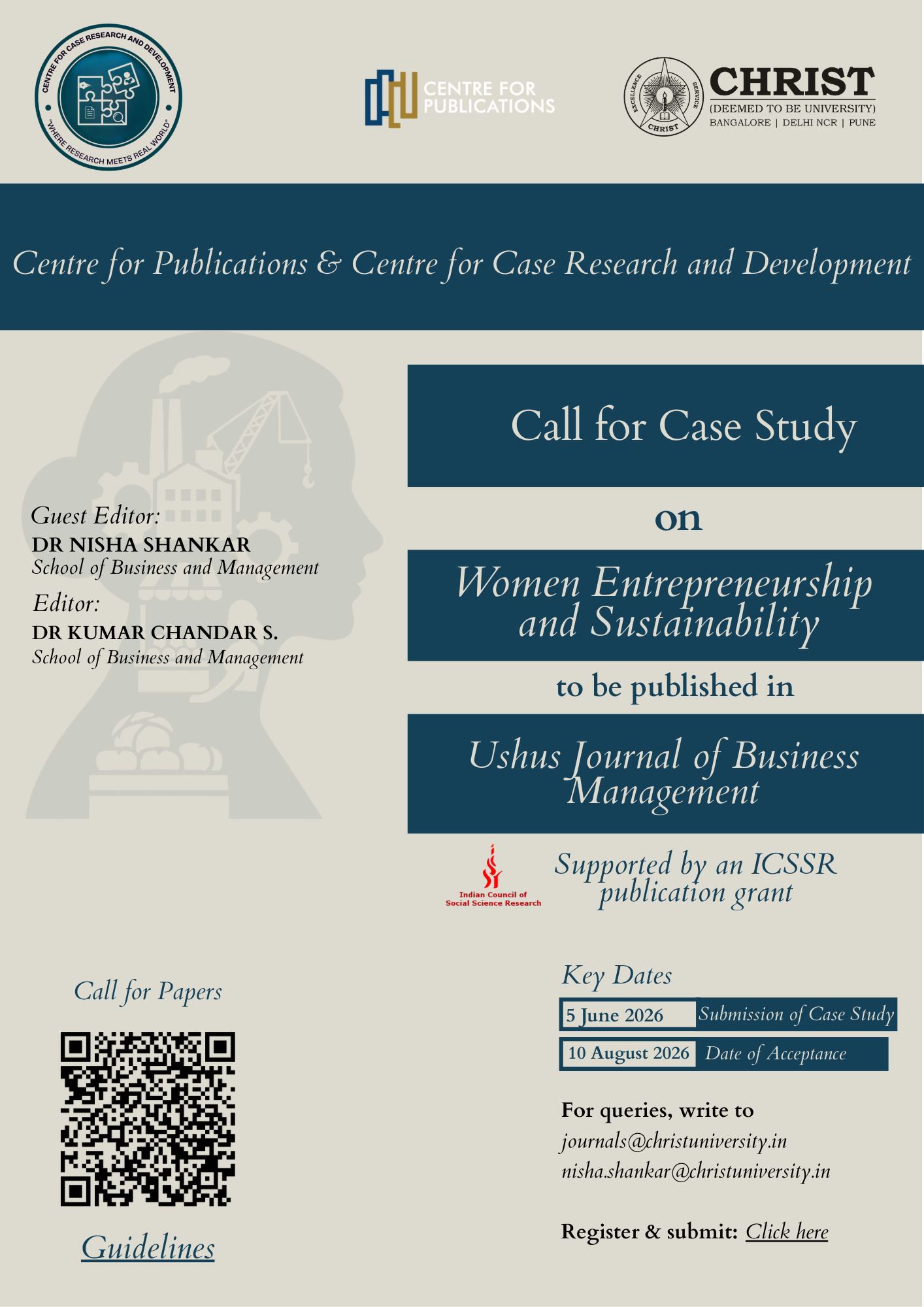Occupation-Related Stress among University Faculty Staff in Kwara State, Nigeria
Outcomes on Goal Achievement
DOI:
https://doi.org/10.12725/ujbm.54.2Keywords:
Coping Strategies, Goal Achievement, Risk Factors, Socio demographic Parameters, Stress LevelAbstract
This study examined occupational-related stress among university faculty staff and its implications on goal attainment of universities in Kwara State, Nigeria. The research design was a descriptive research of a cross-sectional survey. Multi-stage sampling technique was used for the selection of 458 faculty staff. Data were collected with the use of 57-item questionnaire. Data collected were analyzed with relevant statistics like percentage, mean, standard deviation, t-test statistics and analysis of variance (ANOVA). Findings revealed that the level of stress among faculty staff was high (3.25), while stress level differs based on gender (p<.05), age (p<.01), marital status (p<.01), work experience (p<.05) and ownership of workplace (p<.05). The prominent risk associated with occupational-related stress were the organizational-related (cluster mean 3.26) and role-related (CM 3.26) factors. Finding further indicated that the social support (CM 3.00) and individual-focused (CM 2.91) coping strategies were moderately adopted for managing occupational-related stress among university faculty, while the organizational support coping strategy was utilized to a low extent (CM 2.47). The findings implicate the attainment of university goals because of the negative effect high-stress level will have on the physiological and behavioural state of faculty staff adding to destructive work and health anomalies.
References
AbdulRaheem, J.W., Atunde, M.O., Medupin, J.A., Awarun, O. & Ayoku, O. B. (2020). Role conflict and staff productivity in academic libraries: A study of private universities in Kwara State, Nigeria. Texila International Journal of Management, 6 (2), 129 - 138. DOI: 10.21522/TIJMG.2015.06.02.Art014
Adebiyi, D.R. (2013). Occupational stress among academic staff of Ekiti State University, Ado-Ekiti. European Scientific Journal, 9 (4), 202 - 208.
Amoako, E.P., Gyamfi, O.A., Emmanuel, A.K. & David, B. (2017). The effect of occupational stress on job performance at Aspet A. company limited. Global Journal of Arts, Humanities and Social Sciences, 5 (8), 1-17. Available online at: www.eajournals.org.
Atunde, M.O. (2011). Influence of management information system on academic staff effectiveness in Kwara State Colleges of Education. Unpublished M.Ed Thesis, National Open University of Nigeria.
Azizah, A., Rozainee K., Nada I., Izreen S. &Norhafizah Z.I. (2016). The prevalence of occupational stress and its association with socio-demographic factors among lecturers in a private university in Malaysia. International Journal of Public Health and Clinical Sciences, 3 (4), 63 – 71.
Betonio, J.R. (2015). Stress factors and the teaching performance of the college faculty. International Journal of Social Science and Humanity, 5 (7), 651 – 655. DOI: 10.7763/IJSSH.2015.V5.534
Bhandari, S. (2018, November 26). Is My Stress Level Too High? Accessed on December 13, 2019 from https://www.webmd.com/balance/stress-management/stress-management
Chaudhry, A.Q. (2013). Analysis of occupational stress of university faculty to improve the quality of their work. Journal of Quality and Technology Management, 9 (1), 12 – 29.
Dandona, A. (2014). A study on occupational stress of lecturers and physicians. International Journal of Law, Psychology and Human Life, 3 (1), 1 - 6
EOHS (2011, 14 January). Summary of generic prevention and control strategies. Accessed on December 18, 2019 from https://www.iloencyclopaedia.org/part-v-77965/psychosocial-and-organizational-factors/prevention/item/69-summary-of-generic-prevention-and-control-strategies
Falola, H. O., Salau, O. P., Omoniyi-Oyafunke, C. & Olokundun, A. M. (2016). Effect of marital instability on employee performance in selected commercial banks in Nigeria. International Business Management, 10 (21), 5158 – 5163.
Foy, T.J. (2015). Managing workplace stress for increased performance in an Irish higher education institution. Doctoral thesis, Walden University.
FRN (2013). National policy on education (6th Ed.). Abuja, Nigeria: NERDC Press.
Gawati, F.A. (2017). Job stress and staff performance in national examination council, Minna, Niger State. Unpublished M.Ed thesis, National Open University of Nigeria.
Goh, Y. W., Sawang, S. &Oei, T. P. (2010). The revised transactional model (RTM) of occupational stress and coping: An improved process approach. The Australian and New Zealand Journal of Organisational Psychology, 3, 13-20.
Gunawan, E., Deo, P., Hidayat, T., Pandia, V., Iskandar, S., Yuni, P.S, Sylviana, N., Akbar, I., Farenia, R., Wahyu, K., Purba, A. & Hatta, S. (2018). Factors correlated with occupational stress among university lecturers. Medicine & Health, 13(2), 95-102. https://doi.org/10.17576/MH.2018.1302.9
Ismail, N.H. & Noor, A. (2016). Occupational stress and its associated factors among academician in a research university, Malaysia. Malaysian Journal of Public Health Medicine, 16 (1), 81-91
Ismail, N., Abd Rahman, A. & ZainalAbidin, E. (2014). Organizational factors associated with occupational stress among lecturers in community colleges, Peninsular Malaysia. Iranian Journal of Public Health, 43 (3), 125-130. Available at: http://ijph.tums.ac.ir
Kataoka, M., Ozawa, K., Tomotake, M., Tanioka, T. & King, B. (2014). Occupational stress and its related factors among university teachers in Japan. Health, 6 (5), 299-305. http://dx.doi.org/10.4236/health.2014.65043
Karihe, J.N., Namusonge, G. S. & Iravo, M. (2015). Effects of working facilities stress factors on the performance of employees in public Universities in Kenya. International Journal of Scientific and Research Publications, 5 (5), 1 – 16.
Kumar, D.S. & Rajeswari, V. (2017). A study on stress and job performance among school teachers of Karimnagar City. International Journal of Management, IT & Engineering, 7 (12), 245 - 257.
Kusi, H., Codjoe, A. & Bampo, J. (2018). Occupational stress among female lecturers at the University of Education, Winneba, (Winneba Campus), Ghana and management strategies. International Journal of Development and Sustainability, 7 (11), 2637-2651.
Masuku, S. & Muchemwa, S. (2015). Occupational stress among university lecturers: A case of Zimbabwe. US-China Education Review A, 5 (4), 258-266. doi: 10.17265/2161-623X/2015.04.003
National Universities Commission (2018). Nigerian university system statistical digest, 2017. Slough, UK and Delhi, India: Sterling Publishers, p. 26 – 29. ISBN: 978-978-965-138-2.
Nkemakolam, E.C. (2016). Work stress and coping strategies among teachers in private primary schools in Owerri Educattion Zone of Imo State. M.ED thesis, University of Nigeria, Nsukka, Nigeria.
Nguyen T.M.A & Nguyen, Q.H. (2017). Relationship between occupational stress among university lecturers and their job satisfaction: A study in Hanoi University of Science and Technology (Vietnam). ICECH2017 – International Conference on Emerging Challenges: Strategic Integration
Noormaliza, H., Najibah, A.R., Fauzana, M., Azizah, A. &Nukhdiha, O. (2016). Association between occupational stress and stress biomarkers among lecturers at Universiti Selangor, Shah Alam. Proceedings of UNISEL Bestari Research Projects 2016, Ed(s): SetyawanWidyarto, et.al., Shah Alam: FIIT-UNISEL Publisher, ISBN: 978-983-3757-29-9. 154 – 157.
NurAqilah M. Y. & Juliana J. (2012). Association between Occupational Stress and Respiratory Symptoms among Lecturers in Universiti Putra Malaysia. Global Journal of Health Science, 4 (6), 160 – 169. http://dx.doi.org/10.5539/gjhs.v4n6p160
Omoniyi, M.B.I (2016).Sources of workplace stressors among university lecturers in South West Nigeria: Implication for counselling. 1st Annual International Interdisciplinary Conference, Proceedings AIIC 2013, 24-26 April, Azores, Portugal - 589 - 596
Peretomode, O. (2015). Work and stress among academic administrators of higher education institutions in Delta State. European Scientific Journal, 8 (13), 29 – 36.
Pezaro, S. (2018, March 22). Theories of work-related stress. Accessed on December 18, 2019 from https://sallypezaro.wordpress.com/ 2018/ 03/22/theories-of-work-related-stress/
Rice, V. H. (2012). Theories of stress and its relationship to health. In V. H. Rice (Ed.), Handbook of stress, coping, and health: Implications for nursing research, theory, and practice (p. 22–42). Sage Publications, Inc.
Sabherwal, N., Ahuja, D., George, M. & Handa, A. (2015). A study on occupational stress among faculty members in Higher Education Institutions in Pune. SIMS Journal of Management Research, 1, 18 - 23
Safaria, T. (2013). Job stress among academic staff: A cross-cultural qualitative study. International Journal of Public Health Science (IJPHS), 2 (2), 43 – 58.
Usoro, A.A. (2018). Occupational stress and the job effectiveness of federal university lecturers in Cross River and AkwaIbom States, Nigeria. European Journal of Business and Management, 10 (14), 79 – 84.
Zuraida H. & Nur, F.J. (2015). Factors related to occupational stress among lecturers: A case study in public university. Conference on Business Management Research II (CBMR II 2015) School of Business Management, Universiti Utara Malaysia, 06010 Sintok, Kedah, Malaysia, 22 December 2015 160 – 167.ISBN 978-967-13903-0-6



